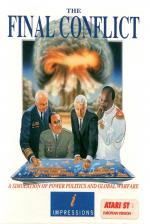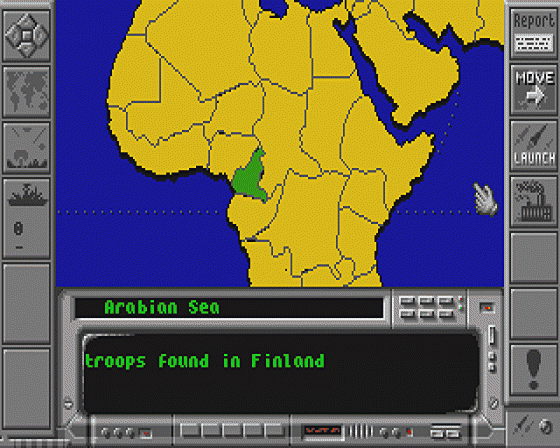
ST Format
 1st September 1994
1st September 1994
Categories: Review: Software
Author: Simon Forrester
Publisher: Impressions Ltd
Machine: Atari ST
Published in ST Format #61
World War 3 has arrived, but no-one realised it could be this dull...
The Final Conflict
Those of you who've ever been involved with international arms and diplomacy will already know it can be a tricky business (find that target reader, Simon). Successfully keeping a planet together is now a job that you too can experience, with Impression's The Final Conflict.
Conflict is a strategy game following the vein of many domination board games, played on a map of the world that can be annihilated by one of two sides. It's up to you to select which scenario and countries you want to include in the game, but that's more of a trivial point - everyone's got missiles, spies and the like, so there isn't really much to choose between one power-crazed director madman and another.
"As a premier of a country of your choice, you must use diplomacy, armed forces, espionage and decision-making skills to try to win the war..." What country uses all of those four, then?

On loading Gauntlet (after a preference screen to set up how complex you want your game to be) you're presented with a world map - this is the main game screen and it doesn't have labels. If you don't happen to be all that hot at geography, you might find this a problem. When Kazakhstan steps out of line, it's pretty difficult to know who to attack without keeping an atlas to hand.
If you're looking for a game with a kick, The Final Conflict just doesn't come up with the goods. The only thing you can tell from the map is who controls a particular country, not where missiles are, where cities are, or what each country is capable of. This information seems to be relayed via a small text window, which happily sits around telling you about countries being conquered, cities begin levelled and every other eventuality of war with the cool but dull hand of a computer. This is a text game that just happens to have a map tacked onto the back.
You communicated your actions using a set of icons on each side of the screen. These actions range from deploying spies and diplomats through to launching missiles and activating your defence network. Occasionally you get the chance to flick to slightly different screens to activate your defence networks, but they're only different version of the same map with added dots (wow).

The Final Conflict is a game with only one real problem - other strategy games. If you are totally new to the genre and want to get into sure pure strategic thinking you'll definitely find what you want in Conflict, but it's not exactly the most sophisticated Armageddon simulator. String at a map and reading text messages just isn't helpful enough when you're trying to keep track of what's going on with the planet - you have no way of knowing what's going on with any particular country until you click on it and read the text messages, and even then you'll be left asking questions.
Launching a missile is a perfect example of this problem, as there's no way of knowing what's going on with it, only that it's been launched and should hit sometime soon. You'll get the same problem with spies, troops, tanks, and everything else you do - you make the decision to do it, and then forget about it until the messaging system decides to let you know what's going on.
Launching Missiles
When playing The Final Conflict you really can't help getting bored. Sitting around launching missiles and guessing just how successful they are can get more than a little dull at times. If someone fires at you, you can flick to a missile defence screen, and play a version of the classic Missile Command, moving your targets around the screen, attempting to gun down the missiles before they trash the target. This is quite an enjoyable departure from the normal map-watching and message-reading, but it really shows Conflict up for what it is - a dull game in need of action. Failing that, it could benefit from better graphical representation, a different control system, or even a few status screens. While we're on the subject, some requirement of strategic thought would be nice.
Overall, The Final Conflict is a possible buy, but only if you're heavily into strategy games. If you're looking for a gentle introduction into the genre and you quite fancy a bit of Armageddon you're in for a boring time, and you'll probably wish you were playing Risk instead. If you're into Missile Command you'll like the sub-game, but the pointless waddling that others call The Final Conflict will get on your nerves.
Highs
- The Missile Command sub-level.
- Reasonable chrome graphics.
Lows
- A static map.
- A total lack of information.
- Limited range of actions.










